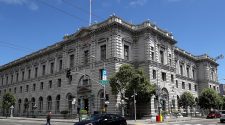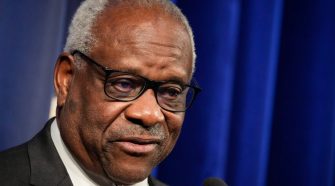Boris Johnson’s election as Conservative leader has been greeted in Brussels with a rejection of the incoming British prime minister’s Brexit demands and an ominous warning by the newly appointed European commission president about the “challenging times ahead”.
Ursula von der Leyen, who will replace Jean-Claude Juncker on 1 November, said both sides had a “duty” to deliver a deal as she offered her congratulations to Johnson on his victory.
“There are many difficult issues we will tackle together,” she said. “It is important to build up a strong working relationship because we have a duty to deliver something which is good for the people in Europe and the United Kingdom.”
The EU’s chief Brexit negotiator, Michel Barnier, tweeted that he wanted to work “constructively” with Johnson on the basis that both sides were committed to facilitating “the ratification of the withdrawal agreement”, the deal struck by Theresa May that the new Conservative leader has repeatedly described as dead.
A cabinet reshuffle
The first task of any new PM involves rewarding some loyal allies and disappointing more. Several Johnson loyalists have had their eye on the post of chancellor, but only one can do it. A complete clearout of May’s remain-minded ministers is expected.
Brexit
The issue that will define a Johnson premiership. He has promised to rapidly renegotiate almost all of May’s departure deal, ditching the Irish backstop border guarantee policy, something that would seem a huge task over any timescale, let alone little more than 12 weeks, a fair proportion of which is taken up by a summer break. If this fails, he will be set on a no-deal departure for 31 October, and a likely huge clash with MPs.
Iran
If Brexit wasn’t enough, a new Johnson government must immediately take steps to make sure he doesn’t begin his time in No 10 with a slide into war. The situation in the gulf is complex, fast-moving and hugely dangerous. Johnson did not cover himself in glory as foreign secretary, especially over Iran. It will be his task to prove he has learned.
Managing parliament and Tory MPs
Johnson will start as PM with a working Commons majority of four, thanks to the DUP, but within weeks it is likely to be down to three if as expected the Liberal Democrats win in the Brecon and Radnorshire byelection. If this wasn’t tricky enough, a small but significant section of Tory MPs openly detest Johnson, and will not want to help him out.
Loosening the purse strings
Such has been the fiscal largesse on display from both Johnson and Jeremy Hunt during the hustings process that much as he will seek to kick any decisions towards an autumn budget, voters – especially Tory members – will be expecting both tax cuts and more spending on areas such as education and the police.
Everything non-Brexit
This might sound glib, but there is a lot to consider – during the three-plus years of Brexit introversion May’s government failed to properly grasp any of a series of long-term, pressing national problems: the crisis in social care; the future of the NHS; a climate emergency; the increasingly insecure future of work; a broken housing market; rampant poverty, including among many working people. This is a huge workload for any new administration.
Being prime ministerial
Critics might say this is Johnson’s single biggest challenge. The leadership process has shown that while he endlessly harked back to supposed successes as London mayor – an often ceremonial role with relatively few powers – Johnson was notably quieter about his period as foreign secretary.
Being prime minister is like the latter, to a factor of 10 – a never-ending succession of red boxes containing vital documents, of urgent briefings, of a whole system hanging on your decisions. Johnson has a tendency to ignore advice, pluck statistics out of the air and rely on sudden, cheap glibness. Curbing these long habits will be a daily struggle.
Peter Walker Political correspondent
The French president, Emmanuel Macron, said he wanted “very much to work with [Johnson] as quickly as possible” and would call him “when he is officially prime minister”.
But in an indication of the political baggage that Johnson will bring into Downing Street, EU officials felt free to take potshots in the hours immediately before the announcement of his election by the Conservative party membership.
One eastern European commissioner, Vytenis Andriukaitis, likened Johnson’s “unrealistic promises” to those of the former Russian president Boris Yeltsin, whose empty rhetoric was said to have ushered in the authoritarian rule of Vladimir Putin.
The Lithuanian health commissioner, Vytenis Andriukaitis, wrote in a blogpost published on the European commission website: “It is a different Boris, of course, but there was something in the way of doing politics that was similar: many unrealistic promises, ignoring economic rationales and rational decisions.
With the confirmation that Boris Johnson has won the Tory leadership contest, he will formally take on the role of prime minister on Wednesday afternoon.
Wednesday 24 July
Noon: Theresa May will take her final PMQs in the Commons. She is then expected to head to Buckingham Palace to formally resign as prime minister. Shortly afterwards, Johnson will head to the palace to be invited by the Queen to form a government and become prime minister. During the course of the afternoon and evening there will be announcements on who will form the new cabinet, and he may give a speech outside 10 Downing Street.
Thursday 25 July
Parliament sits for the last day before it begins the summer recess. Johnson is expected to address the Commons.
Tuesday 3 September
After a five-week break, parliament returns.
Sunday 29 September-Tuesday 2 October
The new prime minister will face their first Conservative party conference, which is being held in Manchester.
“These decisions led to a new autocratic constitution and finally paved the way to Vladimir Putin. Today in Russia we have oligarchs, a pseudo-market economy, a regulated, governed pseudo-democracy. And, Putin’s authoritarianism. For Boris Yeltsin, the warning came true: ‘Boris, you are wrong.’ Hopefully, it will not be the case for Boris Johnson if he is elected today.”
Andriukaitis added: “I can only wish him luck in ‘taking back control’, spending more money on the NHS, swiftly concluding new trade agreements. In other words, I hope and wish that he does not give anyone a reason to use the quote ‘Boris, you are wrong’ against him.”
During the leadership campaign, Johnson said he would scrap the Irish backstop and hold back the UK’s £39bn financial settlement until the EU agreed a comprehensive trade deal.
At a press conference in Brussels, Frans Timmermans, the former Dutch foreign minister who is Juncker’s deputy in the commission, stood by his recent comments in which he accused Johnson of “playing games” with Brexit, adding that the new prime minister’s “character, persona, attitude” would have no bearing on the EU’s negotiating position.
Timmermans said: “He took a long time deciding whether he was for or against Brexit. And now his position is clear. I think the position of the EU is also clear. The United Kingdom reached an agreement with the European Union and the European Union will stick to that agreement. And we will hear what the new prime minister has to say when he comes to Brussels.”
Timmermans, who insisted the British public had not voted for no deal when they voted for Brexit in 2016, told reporters: “I think what came out of the negotiation is the best possible solution in a very complicated situation. It does justice to both the position of the EU and the United Kingdom and I would hope we can continue to work on the basis of that assumption.
“I think if you have an agreement between a country and an organisation like the EU I think it’s the responsibility of us all to stick to that agreement and make it work …
“The world’s politics is rife with colourful people these days and if you can’t deal with them there is not much you can do … I don’t think his character, persona, attitude makes any difference in that sense. We reached a deal that was the best possible deal and I hope this is something that is understood in Westminster.”
















